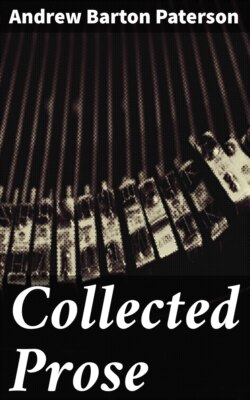Читать книгу Collected Prose - Paterson Andrew Barton - Страница 7
На сайте Литреса книга снята с продажи.
HOW I SHOT THE POLICEMAN
ОглавлениеTable of Contents
He was a short, fat, squat, bald-headed officer with a keen instinct for whisky, and an unlimited capacity for taking things "easy"; he would have been a tall man had Providence not turned round so much of his legs to make his feet. He used to "mooch" about the village at night, and if he saw any lights burning late in the houses, he would casually look in to see that nothing was amiss, and pretend to be very vigilant and on the alert, and he very often was rewarded with a stiff drink of whisky. If he had no excuse to go in, he used to rattle at the gates to see that the fastenings were all right, and when the proprietor came out he would say, "All right, sir! I was just seeing that the gate was fast! Very dry night, sir!" And this generally ended in a liquid and spirituous manner. But the system one night resulted in serious damage to the constable himself, as I shall proceed to explain.
I was reading for an examination and burning the midnight oil; in front of the house was a small garden, into which an old grey horse that belonged to an Irishman up the village was constantly straying down the road and making his way. He could lift the gate catch with his nose, and many a time in the stilly night I used to hear him rattling at it trying to get the gate open. Then I would leave my books, and sally out and drive him away with language and blue metal. Next time he happened to be loose he would play the same game. He became very crafty too, and would clear out like lightning the moment he heard anyone stirring in the house, so that it became a most difficult matter to land a rock on him at all. Tired of this kind of thing, I one night prepared a little surprise for him. I got a two-pound dumb-bell, laid it ready in the balcony overlooking the gate, so that I could rush out and get it the moment I heard him: and I calculated to give him the hardest knock he ever had. Then I went back to the books and read on.
The night wore on and midnight approached: it was dark as the inside of a cow, and a little wind was blowing. Suddenly I heard a faint "rattle, rattle" down at the gate. I drew a long breath, slipped noiselessly into the balcony, grasped the dumb-bell and let it go with terrific force right at a dim object just looming through the pitchy darkness. The astute reader will, of course, have divined that it was not the old grey horse this time. It was the policeman. The two-pound iron dumb-bell had struck him fair on the temple; if it had hit him anywhere else it would have killed him.
He threw up his hands and fell like a dead man. I rushed to his assistance. It is useless to try and set out half the things that flashed through my brain as I rushed downstairs. In my mind's eye I saw myself before the coroner's jury; I saw myself at the criminal court with Judge Windeyer trying me; I heard the jury bring in a verdict of guilty with a strong recommendation to mercy, and I knew that meant hanging for certain, as people recom-mended to mercy always perish on the scaffold in Australia. I saw a blotched diagram of the locality published in the daily papers with a cross to mark the spot where the policeman fell, and an asterisk to show the position of the murderer when he hurled the bloodthirsty dumb-bell. I saw my portrait--that of a dreadful-looking ruffian--in the Town and Country Journal--and then, having reached the prostrate form of the blue-bottle, I lifted him in my arms and ascertained that he still lived. With tender care I bathed his alabaster brow; I watched with eagerness as he slowly came round; as soon as he was conscious I began to apologise, to explain, to grovel. He listened for a while and then he said, "Oh, it's all right, Banjo. It was an unfortnit haccident. Do you happen to have a little whisky in the house? My tongue is dry enough to strike matches on."
I loaded him up with whisky, gave him a substantial Christmas box and sent him on his way as good as new. I believe you could shoot him with dumb-bells every night in the week on the same terms.
The Bulletin, 4 January 1890
